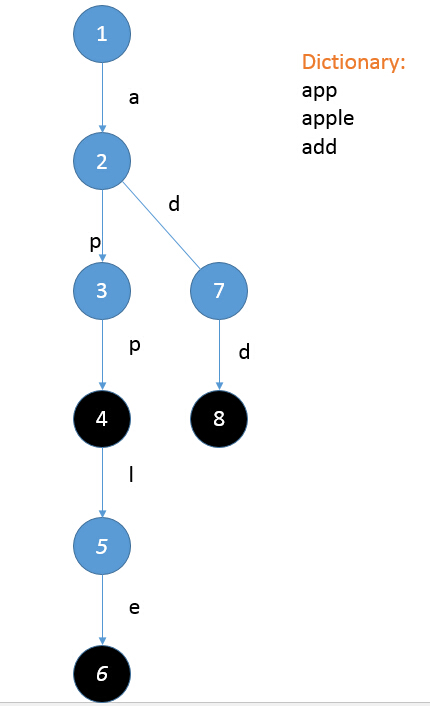算法原题来自:hihocoder
你可以在我的github获取源码:https://github.com/Wtango/hihocoder
Trie树,Trie树的名字有很多,比如字典树,前缀树等等。Trie树可以应用与辞频统计、前缀统计等,其原理是利用公共前缀来减少查询的时间,减少无谓的查询以提高查询时间。
我们看一个Trie树例子:字典有app、apple、add三个单词

Trie树根节点不包含字符,除根节点外每一个节点都只包含一个字符; 从根节点到某一节点,路径上经过的字符连接起来,为该节点对应的字符串; 每个节点的所有子节点包含的字符都不相同。每个节点所能容纳的子树应该为字典的字符宽度,即题目中为26个英文单词,则这个Trie树的度为26.
一、定义这个树的节点:
typedef struct TrieNode{
struct TrieNode *childNode;
char nodeChar;
int count;
uint8_t word_flag;
}trie_node_t;
count用于统计经过这个节点的单词,我们在建立Trie树的时候就可以把这个字段初始化好,虽在这样可以大大提高我们统计单词前缀的速度。
二、添加节点
void add_trie_node(trie_node_t *root,const char *word,size_t len)
{
if(len == 0)
return;
int k = word[0] - 'a';
if(root->childNode[k].nodeChar == 0){
init_node(&(root->childNode[k]),word[0],len == 1?1:0);
}
root->childNode[k].count += 1;
add_trie_node(&(root->childNode[k]),++word,--len);
}
init_node()函数用来初始化一个节点,我们使用word[0] – ‘a’来计算当前字符应该放在当前节点的哪一个叶子。当添加单词经过一个节点时候就将count加1,表示有多少个单词经过这个节点,在统计前缀的时候就可以直接使用了。
三、查询
int search_tree(trie_node_t *root,const char *word,size_t len)
{
if(len == 0)
return 0;
int k = word[0] - 'a';
if(root->childNode[k].nodeChar == word[0]) {
if(len == 1) {
return root->childNode[k].count;
}
else {
return search_tree(&(root->childNode[k]),++word,--len);
}
}
return 0;
}
四、完整代码
#include <stdio.h>
#include <string.h>
#include <stdlib.h>
#include <stdint.h>
typedef struct TrieNode{
struct TrieNode *childNode;
char nodeChar;
int count;
uint8_t word_flag;
}trie_node_t;
void init_node(trie_node_t *node,char nodeChar,uint8_t word_flag)
{
node->childNode = (trie_node_t*)malloc(sizeof(trie_node_t) * 26);
memset(node->childNode,0,sizeof(trie_node_t) * 26);
node->nodeChar = nodeChar;
node->count = 0;
node->word_flag = word_flag;
}
void add_trie_node(trie_node_t *root,const char *word,size_t len)
{
if(len == 0)
return;
int k = word[0] - 'a';
if(root->childNode[k].nodeChar == 0){
init_node(&(root->childNode[k]),word[0],len == 1?1:0);
}
root->childNode[k].count += 1;
add_trie_node(&(root->childNode[k]),++word,--len);
}
int search_tree(trie_node_t *root,const char *word,size_t len)
{
if(len == 0)
return 0;
int k = word[0] - 'a';
if(root->childNode[k].nodeChar == word[0]) {
if(len == 1) {
return root->childNode[k].count;
}
else {
return search_tree(&(root->childNode[k]),++word,--len);
}
}
return 0;
}
int main(int argc,char *argv[])
{
int times;
char buf[11] = {0};
trie_node_t root;
init_node(&root,0,0);
for(scanf("%d",×);times != 0;times--) {
scanf("%s",buf);
add_trie_node(&root,buf,strlen(buf));
}
for(scanf("%d",×);times != 0;times--) {
scanf("%s",buf);
int num = search_tree(&root,buf,strlen(buf));
printf("%d\n",num);
}
return 0;
}